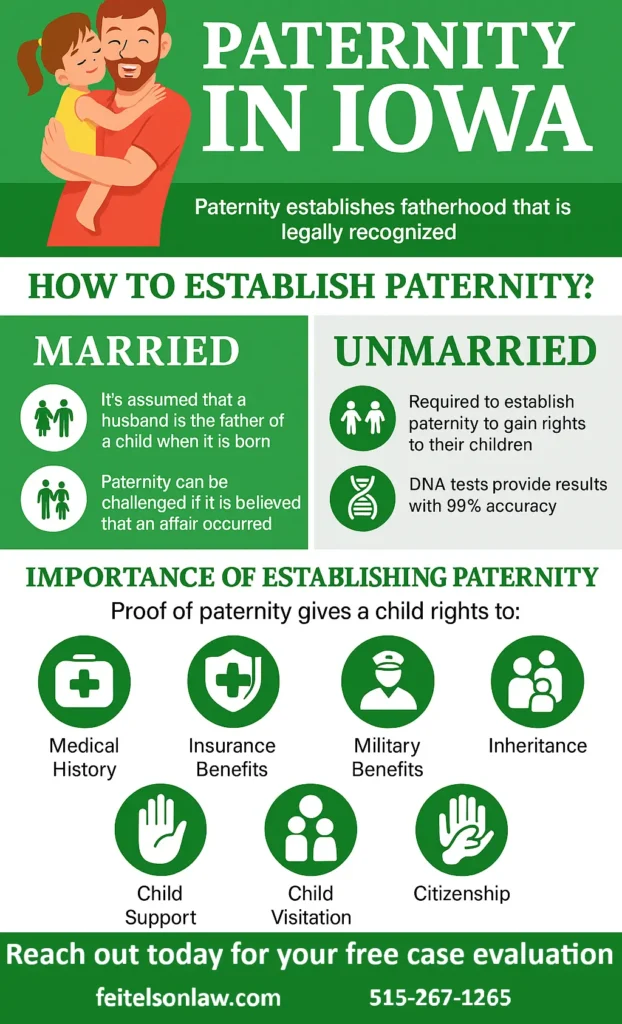- Contact Us for a Free Consultation 515-267-1265
When a marriage begins to break down, one of the first questions many people ask is whether they should vacate...
After separation or divorce, parents eventually begin rebuilding their personal lives. New relationships are a natural part of that process....
Family law disputes are emotionally charged. When relationships break down, disagreements about custody, parenting time, finances, or property can escalate...
A great experience with a lawyer, and fairly cheap too. He will always give you all the options, talk you threw the options, and will tell you some odds. He explains any question and doesn’t seem to be bothered by it. The easiest time I had with a lawyer ever. Highly Highly recommend.
I hired Jeremy for my child custody case. He is incredibly knowledgeable but also speaks to you in a way that’s very direct and easy to understand. He was very thorough and always responded quickly. He showed up to trial extremely prepared and always did a good job of helping put my mind at ease. I would absolutely recommend him, and I’ll hire him again in a heartbeat if I ever need anything else.
Jeremy is absolutely amazing!!! Very professional and does a great job of explaining processes. He has done a great job handling all of our family needs!!! High recommend Feitelson Law Firm!!!

Paternity is the legal recognition of a man as a child’s biological and legal father. At the same time, while it might seem like a straightforward concept, establishing paternity in Iowa can be an emotionally charged and legally complex process. For some parents, it’s about securing legal rights to raise and support a child. For others, it’s about ensuring a child has access to financial support, medical benefits, and a complete identity. Understanding your rights and obligations is essential regardless of which side of the case you’re on.
At Feitelson Law Firm, our Des Moines paternity attorney helps individuals—mothers and alleged fathers—navigate Iowa’s paternity laws with care, clarity, and strategic focus. Whether you are trying to establish paternity to seek child support or assert your parental rights, or are responding to a paternity claim and seeking clarity about your legal status, we will guide you through the process step by step.
Establishing paternity protects the parent’s rights and, most importantly, the child’s well-being and future. We are here to help you confidently take this critical step, starting with a free consultation.

Paternity is central to Iowa’s family law because it creates parental legal rights and responsibilities. Without legal paternity, a father has no enforceable right to custody or visitation, and a mother cannot seek court-ordered child support from the biological father. The child may also miss valuable health insurance, inheritance rights, and Social Security benefits.
Establishing paternity can:
Whether you are a mother trying to secure support or a father seeking to play an active role in your child’s life, paternity is the legal foundation for other rights and obligations.
In Iowa, there are three primary ways to establish legal paternity:
Iowa law presumes that the husband is the legal father if a child is born to a married couple. No further action is usually necessary unless someone challenges the presumption.
Unmarried parents can voluntarily establish paternity by signing a legal form called the Affidavit of Paternity. This form is often signed at the hospital after the child’s birth but can also be completed later. Once filed with the Iowa Bureau of Health Statistics, it has the same legal effect as a court order.
This method is fast and cost-effective, but both parents must agree and be confident in the paternity. If either parent later has doubts, the legal process to undo the acknowledgment can be complicated.
When there is disagreement or uncertainty, either parent (or the state) can file a paternity action in court. The court may order genetic testing to determine whether the alleged father is the biological parent. If the results confirm paternity, the court will issue an order establishing legal fatherhood.
At Feitelson Law Firm, we assist with every step of the process—from filing or responding to a paternity petition to arranging DNA testing and attending court hearings. We protect your legal rights while focusing on the child’s best outcome.
Once paternity is legally recognized, several legal rights and responsibilities are triggered.
Depending on the circumstances, the court may issue orders relating to:
We work with parents on both sides to develop comprehensive parenting plans, calculate appropriate child support, and guide them through any related custody or visitation issues. We aim to ensure a balanced and legally sound outcome that reflects the child’s best interests.
Statewide Paternity and Child Support Data (2024)
Polk County Judicial District Data
Polk County falls within Iowa’s 5C Judicial District. In 2023, this district accounted for 21% of the Iowa Court of Appeals’ docket, with 201 cases originating from this district. While this data pertains to appellate cases and not specifically to paternity cases, it indicates a significant volume of legal matters emanating from the Des Moines area.
If a man believes he is not the biological father of a child and has been wrongly named or presumed as such, he has the right to contest paternity.
This is often the case when:

However, strict legal deadlines and evidentiary standards apply. In some cases, a man who has assumed the role of a father for a long time may be considered a “legal father” even if a DNA test later excludes him as the biological parent. These cases are fact-specific and can be emotionally and legally complex.
Our Des Moines paternity attorney will review your case, explain your options, and help you take the appropriate legal steps to challenge or disestablish paternity if justified.
If the alleged father refuses to sign an acknowledgment of paternity or participate voluntarily in the process, a court-ordered paternity action may be necessary.
The court can:
We represent clients on both sides of contested paternity cases. Whether you are a mother seeking to secure legal recognition and support for your child or an alleged father facing a paternity claim, we will protect your rights and ensure your case is handled fairly and respectfully.
While paternity cases may appear straightforward, they often involve sensitive emotional issues, legal deadlines, and long-term consequences. An experienced family law attorney can help you understand the implications of every decision and ensure your parental rights—or the rights of your child—are protected.
At Feitelson Law Firm, our Des Moines paternity lawyer can help you:
We understand that every case is personal. Whether you’re establishing paternity to connect, support, or clarify, we’ll guide you through the legal process with professionalism, compassion, and a commitment to results.
Whether you’re seeking to confirm parentage or defending against a claim, paternity matters deserve careful legal attention. At Feitelson Law Firm, we help clients in Des Moines establish or contest paternity while protecting their parental rights and putting the child’s best interests first.
Contact our Des Moines paternity attorney today to schedule a consultation. We’re here to help you move forward with confidence, clarity, and trusted legal support.
The cost of establishing paternity in Iowa varies based on the method used. A voluntary acknowledgment through an Affidavit of Paternity is free if completed at the hospital or costs around $15 if filed later with the Iowa Bureau of Health Statistics. Court-ordered paternity cases involve filing fees, as well as additional costs for genetic testing. If you qualify for court-appointed counsel due to financial hardship, the state may cover some costs. Additional attorney fees depend on case complexity and whether the action is contested. At Feitelson Law Firm, we provide transparent fee structures during your initial consultation.
Under Iowa law, paternity can be established at any time before the child turns 19. However, taking earlier action is generally advisable. If both parents sign an Affidavit of Paternity, either party has 60 days to rescind it without court involvement. After that, any challenge must go through the court and must be based on fraud, duress, or material mistake of fact. Child support may be ordered retroactively to the child’s birth. Delaying paternity establishment can complicate matters such as custody, health benefits, and legal rights. Prompt action helps protect both the child’s and the father’s interests.
Yes, private paternity tests are available without court involvement. However, their results are typically not admissible in Iowa courts. Only tests performed by an accredited laboratory with a legally valid chain of custody can be used in legal proceedings involving child support, custody, or paternity. If both parents agree after private testing, they may complete a voluntary acknowledgment. Our team of Des Moines paternity lawyers at Feitelson Law Firm can help coordinate legally recognized testing when needed.
If DNA testing excludes you as the biological father, you may petition to disestablish paternity and potentially stop future support. However, Iowa courts consider more than genetics. If you’ve acted as the child’s parent over time, the court may still recognize you as the “presumed father.” Prior child support payments typically cannot be refunded. Terminating obligations involves specific legal steps and deadlines. Feitelson Law Firm can guide you through this sensitive and complex process.
A mother cannot ultimately refuse court-ordered genetic testing. If a legal paternity action is filed, Iowa courts may order DNA testing for all parties. Refusing to comply with such an order can lead to contempt charges and other legal consequences. However, a mother is not required to submit to voluntary testing unless court proceedings are initiated. Our paternity lawyers in Des Moines can help enforce or respond to testing orders in accordance with Iowa law.
The court-ordered paternity process in Iowa typically takes 3 to 6 months. This depends on case complexity, court schedules, and whether the case is contested. After filing the petition, the opposing party has 30 days to respond. Genetic testing generally takes 2 to 4 weeks. Uncontested cases move more quickly, while those involving custody or support disputes may take longer. Feitelson Law Firm works efficiently to advance your case while ensuring full legal compliance.
Unmarried fathers in Iowa have the right to establish paternity and then pursue custody, visitation, and shared decision-making. Until paternity is legally confirmed, these rights do not automatically apply—even if the father’s name is on the birth certificate. Once paternity is established, fathers can request joint custody and parenting time, and take part in decisions about the child’s health, education, and upbringing. Our qualified Des Moines paternity attorneys help unmarried fathers protect and assert their rights under Iowa law.
Yes, paternity can still be established in Iowa until the child’s 19th birthday. Adult children may initiate proceedings to confirm paternity for reasons such as inheritance, medical history, or Social Security eligibility. However, child support typically ends at age 18 (or graduation from high school, whichever is later), so financial implications are rare. These cases focus more on legal recognition and family connections. Feitelson Law Firm assists in handling adult paternity claims with care and legal precision.
© 2026 Feitelson Law Firm All Rights Reserved. | Privacy Policy | Disclaimer | Sitemap